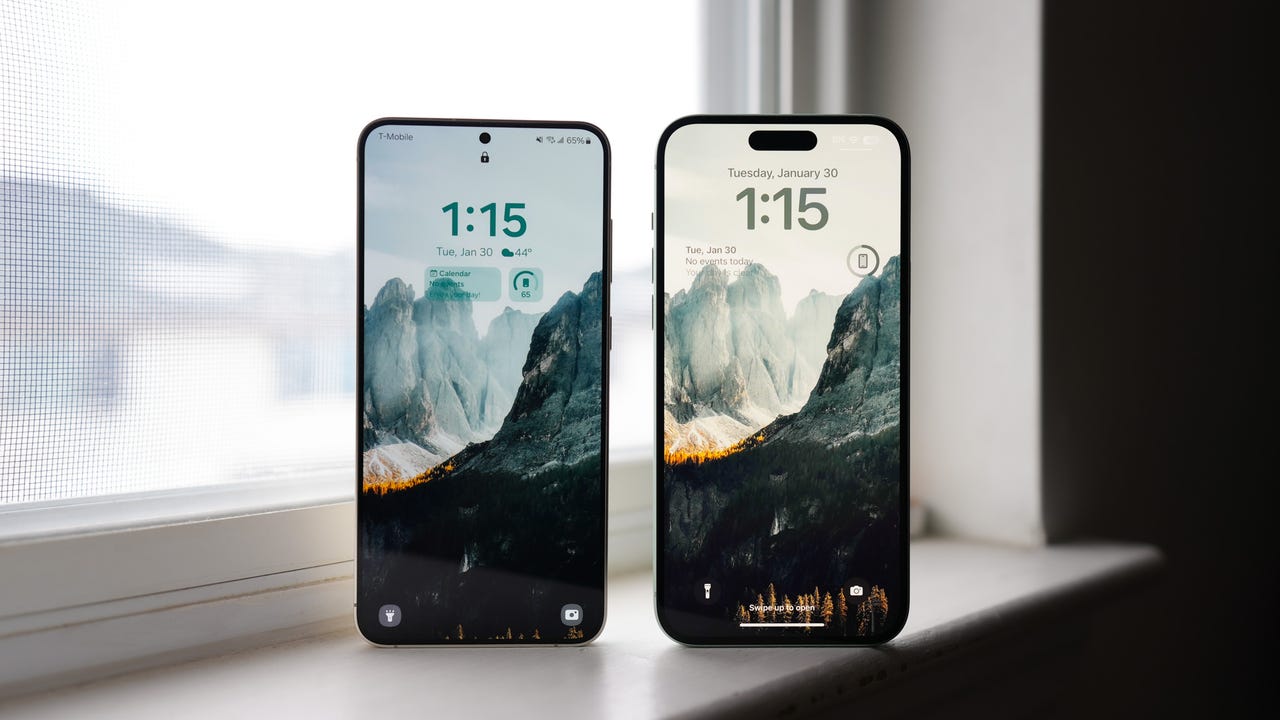
































Apple this week unveiled a slew of iOS 18 features that many would classify as "better late than never." That applies to the new Apple Intelligence tools that should position the company closer to OpenAI, Google, and Microsoft, as well as the more basic customization features that make the iPhone experience more akin to Android.
Also: Apple WWDC 2024 recap: Every new feature in iOS 18, Siri, AI, and more
While none of the new features are readily available yet -- they'll be undergoing beta runs until September, when Apple launches the public software version with the newest iPhones -- you're not alone if the company's early teasing is convincing you to upgrade your phone.
Fortunately, most of what's "new" actually isn't -- they're just not on an iPhone. Here are five of the biggest iOS 18 features that are already accessible on Android, including Google Pixel and Samsung Galaxy phones.
The ability to rearrange apps and widgets anywhere on a home screen grid has existed on Android since the very beginning. Comments and reactions to Apple's announcement on TikTok say it all.
No matter what Android phone you use, a long tap on an app or widget on the home screen will "lift" it so that you can rearrange it, remove it from the grid, or, in some cases, resize it.
Also: 12 useful features Google just announced for Pixel phones, watches, and tablets
Material You, a color-theming tool that Google introduced with Android 12, basically achieves what iOS 18 new app coloring does. Technically, Apple's interpretation is more refined, with a "Tinted" option on top of the standard Automatic, Dark, and Light, though I've gotten mixed results with it for non-Apple apps like Gmail.
However, now that it's been almost four years since Material You debuted, the feature is much more polished, with better colorization for a wider range of apps.
Whether you're on iOS or Android, you can already schedule messages on platforms like Gmail, Outlook, and WhatsApp. However, when it comes to using native messaging apps, Apple is just catching up with Android.
The premise across both operating systems is straightforward; you type your message out and then tap and hold the Send button to set a specific date and time before delivering it.
One of the most anticipated AI features going into WWDC was the new photo-editing tool. Apple officially calls it "Clean Up," as the feature can detect subjects within a photo, remove them from the background, and fill in the blank space based on the surroundings. It's like a clean-up crew for a crime scene, and the crime is whoever photobombed your otherwise perfect shot.
Also: How to use Magic Eraser on the Google Pixel
The effectiveness and reliability of Clean Up remain in question (it might even be better than its alternatives), but its functionality is basically the same as Google's Magic Eraser, which initially was exclusive to Pixel phones but has since become accessible to all Google Photos users. Select Samsung phone models have a similar editing feature that's powered by Galaxy AI.
In fact, Android phones now have features like Magic Editor that take things even further thanks to generative AI. The ability to add new subjects or reposition elements of an image feels like a logical next step for Apple's AI ambitions. For now, only Android has the tools to do it.
If you're sold on the new Apple Intelligence features, you can already get a taste of them via Gemini-equipped Android phones. That includes the latest Google Pixel and Samsung Galaxy phones, which leverage on-device and cloud-based processing to summarize webpages and emails, draft messages, transcribe audio recordings, and more.
Since the new Siri is ChatGPT-powered, you can achieve a similar chatbot experience via the official app, which is free to download on iOS, Android, and the web.
Also: Apple's new AI-generated 'Genmoji' solves a problem we've all had before
While notexactlythe same, you can already tap into Google's Emoji Kitchen to create custom emoticons. They're not as intricate as the AI-generated ones on iOS 18, but if you're ever split between using two emojis, the free generator will come in handy.
iOS 18 will let users lock apps behind Face ID and passwords, preventing unwanted entry when they hand their phone to someone else. While Android phones don't have app-based locks, features like Samsung's Secure Folder (and soon, Android 15's Private Space) will give you even more security and privacy.
Also: Android 15's Private Space feature could better protect your sensitive data
Secure Folder, for example, lets you store apps (and app data), photos and videos, documents, and just about any other file type within a password-secured drive. You can lock the items with a fingerprint, PIN, or password; all the information is stored on-device only.
 Tags chauds:
technologie
Téléphones intelligents
Tags chauds:
technologie
Téléphones intelligents